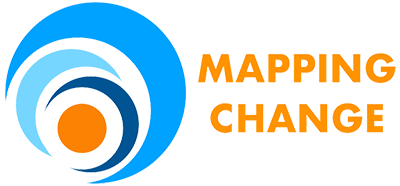Webinars
Integrated consulting for the Third Sector
The first free webinar on www.mappingchange.it was held on Wednesday 18 March 2020 from 4:30 to 5:30 pm.
This webinar introduced the series and each subsequent webinar was dedicated to one of the first 5 areas of specialisation of Mapping Change (we have now reached 8 areas and we’ll see where we go from here):
- Strategic planning based on the Theory of Change approach.
- Strategic co-design on large multi-stakeholder projects.
- Monitoring and evaluation for accountability and continuous learning.
- Development of people and organisations.
- Planning and preparation of Social Reports and Assessments of the Impact generated.
Mapping Change consultants introduce the topic and answer questions posed by the participants.
Strategic planning based on the Theory of Change
After the success of the first webinar, in terms of participation and evaluations, Mapping Change (www.mappingchange.it) decided to hold 5 more free topic-oriented webinars.
The second was dedicated to strategic planning based on the Theory of Change approach.
Strategic co-design, Monitoring and Outcome-driven evaluation
The third free webinar made available by www.mappingchange.it for social professionals is dedicated to:
- Strategic co-design on large multi-stakeholder projects
- Monitoring and evaluation for accountability and continuous learning.
Impact Assessments and Social Reports
The fourth edition of our webinars was dedicated to Impact Assessments and Social Reports and was held on Thursday 9 April at 4:30 pm.
With Antonella Gangeri, Eva Scaini, Cecilia Rossi Romanelli and other social reporting professionals.
These issues are intrinsically linked to the topics of the previous Mapping Change webinars, because:
- both the Social Report and the Impact Assessment need a clear and strong outcome-focused strategy (starting from a solid #theoryofchange)
- only with outcome-driven M&E systems will you have something like a ‘social impact’ to report on and communicate
People and organisations
The complexity we inhabit increasingly requires organisations that are structured to continuously learn from their work and are able to optimise their impact quickly and flexibly, enhancing the potential of people and the different levels of leadership. There is no point developing ambitious strategies and work plans if you don’t, at the same time, nurture the growth of the people who are supposed to implement these strategies and plans and if you don’t place the organisation in the best possible conditions to operate in this complexity.
Integrated fundraising: sustainability at the core
Sixth Mapping Change webinar – Wednesday 6 May 2020
Too often, fundraising arrives late and is added to our areas of action as if it were just another sector among others, when the resources are critically low and, let’s be frank, with the idea that its purpose is to make cash very quickly. There is a problem, however: even though it may give momentary illusions of success, in the medium to long term fundraising does not and will never work like this.
Fundraising works only if it is integrated structurally and transversally into the multi-year strategic plan (approved by the Board) and interacts systematically with all the sectors or departments (whether Accounts, Communications, Design, Human Resources or Outcome Evaluation) and the main stakeholders.
We spoke with our expert, Elena Zanella, and with related professionals. Happy viewing!
Communicating change in times of crisis, repositioning and relaunch
Today, every organisation has to deal more frequently with complex changes and overcome challenges that require rapid, flexible responses. But during major interruptions or a crisis, it is not easy to manage communication, to guarantee an integrated strategic vision and ensure that each communication tool used is effective.
This is why we need to a) draw up a communication plan that steers the organisation through the change step by step, and b) implement correct, coherent and customised communication, capable of directing the right impact (‘you can’t not communicate’) and maintaining the commitment and consensus of all the stakeholders.
We spoke to the Mapping Change experts Genni Rosci, Laura Angeleri and Antonella Gangeri, the Communications Manager of the Centro Medico Sant’Agostino, Silvano Rubino, and the Chief Executive of Terres des Hommes Italia, Paolo Ferrara.
The impact of COVID-19 on our professions and organisations
Before asking ourselves how our lives and organisations will change in the future, before giving or searching for formulas to start again, perhaps we should turn around and look back. Understanding and metabolising what happened. Being honest and coming to terms with it.
From company welfare to territorial welfare
One of the areas in which the real intention of companies to invest in social impact can be measured is clearly that of company welfare. But what are the critical issues? What opportunities have not yet been sufficiently seized by the vast majority of companies? And lastly, what is the level of territorial integration with the welfare provided by public administrations and the Third Sector?
Towards the Social Report and beyond!
Based on the experience acquired by Mapping Change’s consultants even with very different NGOs and Third Sector entities, targeted recommendations and opportunity nuggets to get the most out of your Social Report, both within your organisation and in relation to key stakeholders. All in full compliance with ministerial guidelines.

